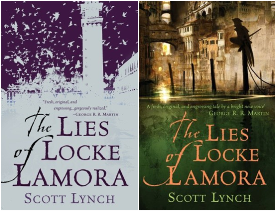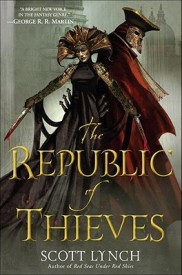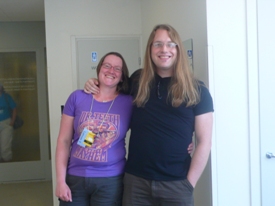 Another Guest of Honor at FinnCon was Scott Lynch, an American fantasy author, best known for his Gentleman Bastard series of novels. He was followed everywhere by a group of fans dressed as some of his characters. According to his website, he’s had a variety of jobs including dishwasher, busboy, waiter, web designer, office manager, prep cook, and freelance writer; right now he is a volunteer fireman. His first novel, The Lies of Locke Lamora, was purchased by Simon Spanton of Orion Books in August 2004 and published in June 2006 under the Gollancz imprint in the United Kingdom and under the Bantam imprint in the United States. The Lies of Locke Lamora was a World Fantasy Award finalist in 2007. In both 2007 and 2008 Lynch was nominated for the John W. Campbell Award for Best New Writer. He also received the Sydney J. Bounds Best Newcomer Award from the British Fantasy Society in 2008. Despite the horde of fans, Amazing Stories found some time to ask him some questions.
Another Guest of Honor at FinnCon was Scott Lynch, an American fantasy author, best known for his Gentleman Bastard series of novels. He was followed everywhere by a group of fans dressed as some of his characters. According to his website, he’s had a variety of jobs including dishwasher, busboy, waiter, web designer, office manager, prep cook, and freelance writer; right now he is a volunteer fireman. His first novel, The Lies of Locke Lamora, was purchased by Simon Spanton of Orion Books in August 2004 and published in June 2006 under the Gollancz imprint in the United Kingdom and under the Bantam imprint in the United States. The Lies of Locke Lamora was a World Fantasy Award finalist in 2007. In both 2007 and 2008 Lynch was nominated for the John W. Campbell Award for Best New Writer. He also received the Sydney J. Bounds Best Newcomer Award from the British Fantasy Society in 2008. Despite the horde of fans, Amazing Stories found some time to ask him some questions.
Tanya Tynjälä for Amazing Stories: You said in your speech that you were born to be a writer, that from the time you were very young you knew you wanted to write, but you were a fan first. How was the transition from reader to writer?
Scott Lynch: It was the kind of experience many have, you became aware that cartoonist make cartoons and writers make books. We had an author come to my school when I was eleven. She was awarded whit the Newberry and Caldecott medals, the major awards in children literature. She was the first real author I had ever met. In retrospect she was hilarious because in the middle of all those children amazed by the fact she was a writer, I remember the only thing she was telling us is how miserable it was to be a writer, that there was no money in it, so it would be better for us not to become writers. But when you are eleven you don’t pick up on this. So as weird as it sounds, she was, in a sense, my inspiration. From then on, I knew that I could be a writer, because there were actually people walking around doing this. I didn’t figure out the bitterness part until years later. And then I can’t remember not being a reader. I do remember when I learned to read, it was around three and four years old. I read all the time. I read a lot of history books when I was a kid and then science fiction when I got to high school. I just found natural that eventually I would be producing my own stories. Reading and writing go hand to hand basically.
this. So as weird as it sounds, she was, in a sense, my inspiration. From then on, I knew that I could be a writer, because there were actually people walking around doing this. I didn’t figure out the bitterness part until years later. And then I can’t remember not being a reader. I do remember when I learned to read, it was around three and four years old. I read all the time. I read a lot of history books when I was a kid and then science fiction when I got to high school. I just found natural that eventually I would be producing my own stories. Reading and writing go hand to hand basically.
AS: Who are your references as a writer and how have they influenced your writing?
SL: My major references when I was in high school were a number of science fiction writers: Frank Herbert, David Brin, Isaac Asimov. Margaret Atwood was also a huge influence when I was a teenager, I read everything from Margaret Atwood I could put my hands on. Also cyberpunk influenced me starting with William Gibson, Pat Cadigan, Bruce Sterling, Rudy Rucker, but Gibson especially. I became pretty aware very early on of Gibson prose style, this visceral punching quality that he had. It was the first thing I tried to emulate during those years. That sort of esthetic sticks to me even to this day. When I got a little bit older I read more fantasy than science fiction: Ursula K. Le Guin – but she is both –, Michael Moorcock, eventually Jack Vance and Fritz Leiber who are also major stylistics influences on me, that I am consciously trying to emulate.

AS: The Gentlemen Bastard Sequence is quite long, seven books and not all have been written. Had you planned it like that from the start or is it a universe that is growing as you write it?
SL: Yes, it is very much plan, very much in detail. It is just that I try to make each novel more or less a complete story rather than write the first part. The goal with the first novel was to write a book that would invite sequels without requiring them. But it was always meant to be a long sequence.
AS: Aren’t you afraid that it will be another Song of Ice and Fire? That it could get much longer?
SL: I have been really thinking on that but my first rule when writing this sequence is that I said there will be seven books and I can’t break that rule. It means, when I have too much material to fit into seven books, some of it must to go. There is a firm rule, that this will be seven books – without exceptions, and that’s the way I am going to deal with it. My publishers have some flexibility in the size of the books they can publish. So it could happen, that when you begin the word count you are presenting a manuscript that is too big to be published in one volume. But we are probably never in any danger of getting anywhere close to that. I am very aware of the word count.
AS: So, how do you avoid repeating yourself writing seven stories with the same characters?
SL: Yes. You can forget things you have written, they can get blurred together in the memory. Ideally you take notes, a lot of them, and have organized files. Some writers are good at it some writers are not. I have files, I would not say they are very organized, but they are and they help me to remember although I have not found the perfect system to work with. It is a matter of being extremely careful. Some writers try very hard to be careful with details, working in a saga, and some of them just don’t give a damn. I am not claiming to be very good at it but I have decided not to not give a damn. I think that is my secret weapon; be aware of the details and try to be careful with them. I actually think about it.
AS: In your presentation you were discussing with your fans whether you should kill a character or not. You pretty determined to kill him but they disagreed. So I wonder how much do you listen to your fans?
SL: That is a difficult question because you got competing pressures. Obviously you should pay attention to what the fans think, you need their feedback, you need to know what they like. But the thing you’ve got to remember is, that above the people that read the book, only a small percentage is going to be identified as fans. It is easy to sit in a bar and talk to certain people who are very  enthusiastic readers, and definitely identified as such, and forget they are not the entire market. We build these little chambers of delusion for ourselves and we lose sight of the size of the market. Let’s say a fantasy book does very well and sells 50,000 copies; 20,000 of these people are never going to pay any attention to web pages, they don’t go to cons. They know what they like and then buy a book. They barely know the author exist. Another percentage might know the author exist and buy the books of that author, and let’s say between ten or twenty percent might read reviews, be aware of communities and finally maybe 5 percent might actually participate in forums, so they are really heavily involved in the conversation, go to conventions and consider themselves fans. So you can get this disproportionate picture of what your book buyers actually want when you only listen to the fans. That is how we turn tiny amount of noise online, Twitter, Facebook, into this perception of a massive avalanche of opinions that just doesn’t exist. So you want to listen to them but you don’t want to see the size of them, as a demographic, out of proportion. And most important: you don’t want to lose your ability to surprise them because that is part of what they are for, to be surprised. If you lose the ability to be surprising, startling and different; if you only give them exactly what they expect, ironically they cease to be fans because you’ve become boring. So your fan community it is a pleasure and a trap, you have to be very careful with how you approach them.
enthusiastic readers, and definitely identified as such, and forget they are not the entire market. We build these little chambers of delusion for ourselves and we lose sight of the size of the market. Let’s say a fantasy book does very well and sells 50,000 copies; 20,000 of these people are never going to pay any attention to web pages, they don’t go to cons. They know what they like and then buy a book. They barely know the author exist. Another percentage might know the author exist and buy the books of that author, and let’s say between ten or twenty percent might read reviews, be aware of communities and finally maybe 5 percent might actually participate in forums, so they are really heavily involved in the conversation, go to conventions and consider themselves fans. So you can get this disproportionate picture of what your book buyers actually want when you only listen to the fans. That is how we turn tiny amount of noise online, Twitter, Facebook, into this perception of a massive avalanche of opinions that just doesn’t exist. So you want to listen to them but you don’t want to see the size of them, as a demographic, out of proportion. And most important: you don’t want to lose your ability to surprise them because that is part of what they are for, to be surprised. If you lose the ability to be surprising, startling and different; if you only give them exactly what they expect, ironically they cease to be fans because you’ve become boring. So your fan community it is a pleasure and a trap, you have to be very careful with how you approach them.
AS: Your lastest work: Queen of the Iron Sands has some Science Fiction elements while your previous work was strictly Fantasy. Do you find any differences in the process of writing Science Fiction versus Fantasy?
SL: Science Fiction and Fantasy have always been what you might call “kissing cousins”, have always been very close together. For me they’re just two different flavors of the exact same genre. When we talk about genre, we are also talking about commercial identities, how they are shelved in bookstores and all that. Queen of the Iron Sands is meant to emulate the serial style of a sort of fiction that was very prevalent during the 40’s and 50’s: the planetary romance, and romance in the style of the Three Musketeers. It is definitely Science Fiction, which has some rather fantastical concepts. The science in Queen of the Iron Sands is so goofy that is has to be Fantasy, even if it has a scientific basis. It is meant to be a clear homage to a time in literature in which those two flavors were very frequently packaged together.

AS: Because I asked the question of Elizabeth (Bear) I am kind of forced to ask it of you. How do you avoid jealousy or envy in a relationship with another writer?
SL: It is really not difficult for me to date a writer. Fortunately both of us got into the relationship with our careers at a relative success. Bear is an established name in science fiction and fantasy and has a significant amount of awards. I know it because when I am staying with her I write at a desk that is next to them. So I literally write in the shadow of all her Hugos. My books are also being nominated for some major awards, and considering that there are some writers never nominated, so just to be… It’s cool! Also, they have been a success for the last seven years. The thing is, we both have something to contribute, we have two relatively strong careers. I came from a relationship in which my former spouse was not a writer, so frankly, for me, the fact that Elizabeth understands everything, knows exactly how the industry is and how their practices are, how long is it between paychecks, that I don’t need to explain all this to her and vice versa. Being on the same page in that respect can help in making everything really easy.
AS: What are you working on right now?
SL: I’m working on my 4th novel, The Thorn of Emberlain; a couple of short stories I owe to people; and I definitely have to finish work on a new novella, The Mad Baron’s Mechanical Attic, which is very overdue. Poor Bill Schafer of Subterranean Press deserves much better. That will be part of the story that fits between my 3rd and 4th novels and links those stories. That is what I’ve got for the rest of the year.
To read Queen of the Iron Sands
Thank you To Diane Severson Mori for the corrections











My pleasure, Tanya!